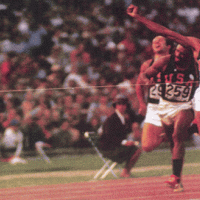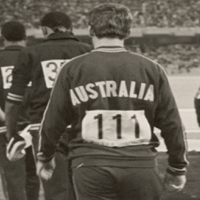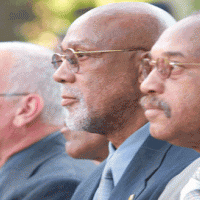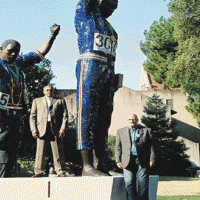Salute/Chariots of Fire | reviews, news & interviews
Salute/Chariots of Fire
Salute/Chariots of Fire
It's the talking truth to power that counts: two films visit the Olympic Games in Paris '24 and Mexico City '68
Apparently it’s the taking part that counts, which would explain why recent weeks have brought unseemly howls of protest and threats of litigation from British athletes who have failed to make it into the Olympic squad. You’d like to sit these people with their adamantine sense of entitlement in front of a couple of this week’s releases. One we know all about.
This was 1968, a year which had already seen the assassinations of Martin Luther King and Robert Kennedy. Racial tension in the US was at its zenith and the peaceful pursuit of equality was travelling nowhere fast, so much so that black athletes considered boycotting the Games in Mexico City and thus depriving the US of a huge haul of track and field medals. They eventually realised that they would also deprive themselves of a platform. But, joining the squad, they were firmly advised by their own association and by the American president of the IOC that the Olympics should not be the forum for political grandstanding.
Norman’s second place was, according to all three, the product of a divine plan
Salute was shot in 2006 for reasons which become movingly apparent towards the end of the film. It was finished in 2008 and its UK release has been astutely delayed to this month of months. It is nominally about those two courageous athletes – Tommie Smith, winner of the 200 metres in a world record time, and John Carlos – who chose to make their symbolic stand towards the end of an Olympiad in which a succession of medal-winning compatriots had somehow failed to seize the day. But standing on the podium with them was a young Australian called Peter Norman who, at the last minute, asked if he too could wear the Olympic Project for Human Rights badge.
Watch the trailer to Salute
Shot by his nephew Matt Norman, Salute is as much the story of the white man behind whom those two fists were defiantly raised. Peter Norman, the son of God-fearing members of the Salvation Army, grew up in Melbourne poor and carefully indoctrinated in the ways of equality. His father had to borrow the boy’s first pair of spikes. At the Olympics he was not fancied to do much, but the track and (although it’s a factor barely mentioned here) the thin air at altitude found him shaving half a second off his personal best. By the time he lined up for the final, he had broken the world record and seen it snatched back in a matter of hours.
 Norman’s second place was, according to all three medallists, the product of a divine plan to put a trio on the podium who would stand morally as one. (Pictured right, Norman at the statue in honour of Smith and Carlos at their alma mater, San Jose State University.) The punishment for each was fierce. Smith and Carlos were sent home in disgrace to face profound economic hardship. Smith, whose world record in the final stood for decades, took a job cleaning cars. Meanwhile in an Australia which forcibly farmed out Aboriginal children to white families and maintained a whites-only immigration policy, Norman was quietly ostracised by his national federation and not selected for the Munich Games in 1972, although fifth fastest in the world that year. Indeed, when Sydney hosted the Olympics in 2000, the country’s greatest ever sprinter was not invited to have any form of official role. No matter that his Mexico City time would have won him gold in Sydney. He had his reward when Smith and Carlos invited him over to Los Angeles and he was not only recognised but humbly thanked by two of the greatest track athletes in history, Edwin Moses and Michael Johnson.
Norman’s second place was, according to all three medallists, the product of a divine plan to put a trio on the podium who would stand morally as one. (Pictured right, Norman at the statue in honour of Smith and Carlos at their alma mater, San Jose State University.) The punishment for each was fierce. Smith and Carlos were sent home in disgrace to face profound economic hardship. Smith, whose world record in the final stood for decades, took a job cleaning cars. Meanwhile in an Australia which forcibly farmed out Aboriginal children to white families and maintained a whites-only immigration policy, Norman was quietly ostracised by his national federation and not selected for the Munich Games in 1972, although fifth fastest in the world that year. Indeed, when Sydney hosted the Olympics in 2000, the country’s greatest ever sprinter was not invited to have any form of official role. No matter that his Mexico City time would have won him gold in Sydney. He had his reward when Smith and Carlos invited him over to Los Angeles and he was not only recognised but humbly thanked by two of the greatest track athletes in history, Edwin Moses and Michael Johnson.
Chariots of Fire reviewed overleaf plus Salute gallery
Watch the new trailer to Chariots of Fire
Salute is perhaps a rather talky account – Carlos would beat all-comers on words per minute - but all three men make for engaging company, especially when they all meet to reminisce. The atmospherics and tension are beautifully done, and telling details teased out (such as why the Americans each wore one half of a pair of gloves, and removed their shoes). The events on the track itself are given their full weight, though if there were any proof that there is still a problem in America, it’s in the person of the other American 200m finalist Larry Questad, who still can’t understand why Smith and Carlos chose to ruin their lives, nor why four black sprinters went into a huddle and excluded him from the 4x100 relay. “I know what it feels like to be discriminated against,” he says, wearing a baffled look 44 years on.
Chariots' portrait of a patchwork Britain saying a long goodbye to the Victorian age still does the job
Spooling back another 44 years in Games history, we reach Paris and another muscular Christian whose beliefs were tested in the kiln of Olympic competition. Eric Liddell's story, and that of the Jewish immigrant's son Harold Abrahams, need no further introduction. While the stage version is currently defying West End gloom, Hugh Hudson's 1981 film still packs a splendid punch. The ungainly running gait of the late Ian Charleson, all stiff back and flappy arms as the flying Scotsman Liddell, remains at odds with his graceful, even soulful presence, while Ben Cross's Abrahams breasts the tape in slow motion with a pugnacity that continues to thrill. Throw in Nigel Havers' career-defining toff Lord Linley, Ian Holm as the canny professional trainer Sam Mussabini and John Gielgud's Cambridge nabob and Chariots' portrait of a patchwork Britain saying a long goodbye to the Victorian age does the job.
Channelling Colin Welland's Oscar-winning robust screenplay, Hudson lays on a visual treat which is much more than the sum of its best-remembered parts: the beach at St Andrews masquerading as Broadstairs in Kent, the music of Vangelis bringing a soundtrack which also features "Jerusalem", Allegri's Miserere and Gibert & Sullivan into the age of the synthesiser. Somehow even that doesn't seem dated. The only thing that no longer quite chimes as clearly as the bells of the Great Quad - but then it didn't then either - is Liddell's refusal to run on the Sabbath. May London 2012 also find athletes fired by a higher purpose than the solipsism of victory.
- Salute is released on DVD on 30 July
Click on images to enlarge
rating
Explore topics
Share this article
more Film
 Fantastic Machine review - photography's story from one camera to 45 billion
Love it or hate it, the photographic image has ensnared us all
Fantastic Machine review - photography's story from one camera to 45 billion
Love it or hate it, the photographic image has ensnared us all
 All You Need Is Death review - a future folk horror classic
Irish folkies seek a cursed ancient song in Paul Duane's impressive fiction debut
All You Need Is Death review - a future folk horror classic
Irish folkies seek a cursed ancient song in Paul Duane's impressive fiction debut
 If Only I Could Hibernate review - kids in grinding poverty in Ulaanbaatar
Mongolian director Zoljargal Purevdash's compelling debut
If Only I Could Hibernate review - kids in grinding poverty in Ulaanbaatar
Mongolian director Zoljargal Purevdash's compelling debut
 The Book of Clarence review - larky jaunt through biblical epic territory
LaKeith Stanfield is impressively watchable as the Messiah's near-neighbour
The Book of Clarence review - larky jaunt through biblical epic territory
LaKeith Stanfield is impressively watchable as the Messiah's near-neighbour
 Blu-ray/DVD: Priscilla
The disc extras smartly contextualise Sofia Coppola's eighth feature
Blu-ray/DVD: Priscilla
The disc extras smartly contextualise Sofia Coppola's eighth feature
 Back to Black review - rock biopic with a loving but soft touch
Marisa Abela evokes the genius of Amy Winehouse, with a few warts minimised
Back to Black review - rock biopic with a loving but soft touch
Marisa Abela evokes the genius of Amy Winehouse, with a few warts minimised
 Civil War review - God help America
A horrifying State of the Union address from Alex Garland
Civil War review - God help America
A horrifying State of the Union address from Alex Garland
 The Teachers' Lounge - teacher-pupil relationships under the microscope
Thoughtful, painful meditation on status, crime, and power
The Teachers' Lounge - teacher-pupil relationships under the microscope
Thoughtful, painful meditation on status, crime, and power
 Blu-ray: Happy End (Šťastný konec)
Technically brilliant black comedy hasn't aged well
Blu-ray: Happy End (Šťastný konec)
Technically brilliant black comedy hasn't aged well
 Evil Does Not Exist review - Ryusuke Hamaguchi's nuanced follow-up to 'Drive My Car'
A parable about the perils of eco-tourism with a violent twist
Evil Does Not Exist review - Ryusuke Hamaguchi's nuanced follow-up to 'Drive My Car'
A parable about the perils of eco-tourism with a violent twist
 Io Capitano review - gripping odyssey from Senegal to Italy
Matteo Garrone's Oscar-nominated drama of two teenage boys pursuing their dream
Io Capitano review - gripping odyssey from Senegal to Italy
Matteo Garrone's Oscar-nominated drama of two teenage boys pursuing their dream
 The Trouble with Jessica review - the London housing market wreaks havoc on a group of friends
Matt Winn directs a glossy cast in a black comedy that verges on farce
The Trouble with Jessica review - the London housing market wreaks havoc on a group of friends
Matt Winn directs a glossy cast in a black comedy that verges on farce





Add comment